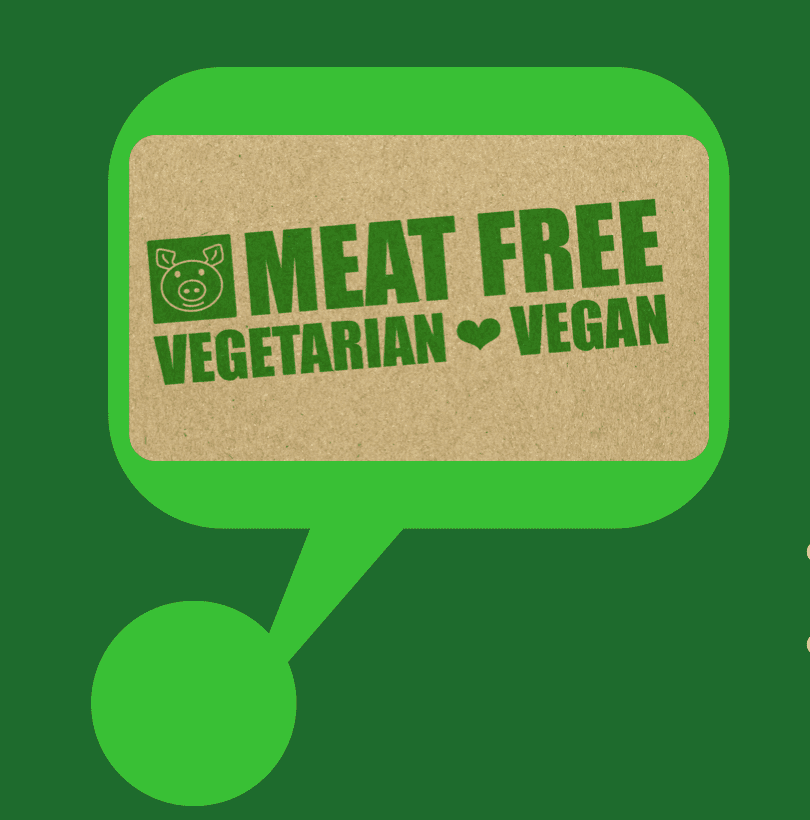From vegconomist.com
Should you label your product meat-free, vegan or plant-based? Last year, ProVeg International produced a report on how ‘vegan’ or ‘plant-based’ labelling impacts mainstream appeal. As part of its work to discover how labels are perceived, the food awareness organisation recently published two new reports that reveal consumers’ understanding of the terms used to describe plant-based food products in the UK and the US.
“Consumers prefer ‘plant-based’ labels to ‘meat-free’ or ‘vegan’ terminology”
These new studies “aim to provide valuable insights into how the food industry can label their products to ensure clarity about ingredients, draw in target consumers and present their products most appealingly,” ProVeg explained.

Here are the findings of both reports.
Report 1: Plant-based labelling
One thousand UK consumers were asked to describe and rate their views on the terms ‘animal-free,’ ‘meatless’, ‘meat-free’, ‘100% plant-based’, ‘plant-based’, ‘veggie’, ‘vegan’, and ‘vegetarian’.
The survey resulted in the following key findings:
- Consumers were most likely to choose a plant-based product with the label ‘100% plant-based’, ‘plant-based’, or ‘veggie’.
- ‘Meatless’ and ‘vegan’ were the least preferred labels.
- ‘Animal-free’, ‘vegan’, and ‘vegetarian’ labels were perceived as animal and eco-friendly.
- ‘Animal-free’ and ‘veggie’ were thought to sound like the most enjoyable and tasty options, while ‘100% plant-based’, ‘vegetarian’, and ‘vegan’ were perceived as healthy, safe, and nutritious.
- Consumers rated the labels ‘veggie’ and ‘vegetarian’ as the most affordable and easy to access.

- 96.4% of consumers told ProVeg they were not confused by plant-based alternatives to chicken being labelled as ‘nuggets’.
- Over 80% of consumers said it is obvious that products labelled ‘vegan’, ‘vegetarian’, and ‘plant-based’ do not contain meat.
- 76% of those surveyed stated that the labels helped them to understand and identify the nature of the product.
“It’s really interesting to see that consumers prefer ‘plant-based’ labels to ‘meat-free’ or ‘vegan’ terminology. These results echo many brands’ current labelling strategies, with the use of ‘plant-based’ labels becoming very common, particularly in the UK, where this survey was conducted,” Stephanie Jaczniakowska-McGirr, director of corporate engagement at ProVeg, said.

Report 2: ‘Plant-based’ vs ‘vegan’
In 2021, ProVeg conducted an online survey to determine consumers’ levels of understanding of the different terms used to describe food products. The study interviewed 400 participants across the UK and the US.
The key findings from that survey are as follows:
- Most respondents understood the term ‘vegan,’ with 69.4% of UK consumers and 61.3% of US consumers choosing the correct definition and saying that they thought these food products do not contain meat, dairy, or eggs.
- About half of the consumers surveyed understood the term ‘plant-based’ correctly. Some consumers (17% in the UK and 26.1% in the US) needed clarification about whether ‘plant-based’ food products contain dairy/eggs. The same went for the term ‘vegetarian’.

- 72.6% of consumers in the UK and 75.4% of consumers in the US understood that a ‘dairy-free’ food product does not contain any dairy, but clarification was needed about the product’s meat content.
- In the same way, 74.9% of UK consumers and 76.8% of US consumers understood that a ‘meat-free’/‘meatless’ food product does not contain any meat, but the dairy/egg content of the product remained unclear.
“It’s great to see that consumers are, in fact, not confused by ‘meaty terms’ such as ‘nugget’. We hope these results will contribute towards creating a favourable regulatory and labelling landscape for plant-based products, particularly when we’re seeing uncertainty around such topics in Europe,” Jaczniakowska-McGirr added.




